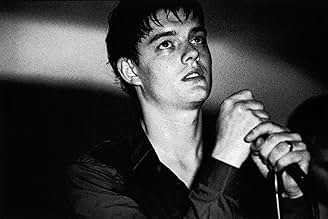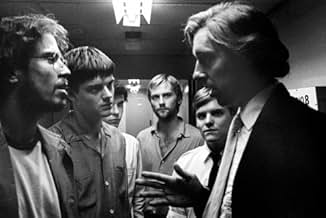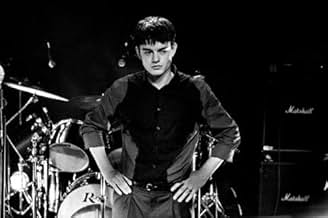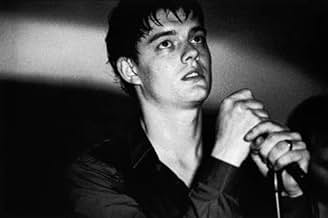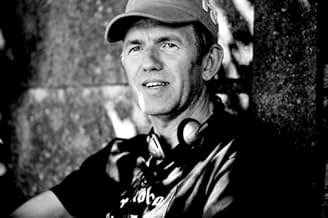VALUTAZIONE IMDb
7,6/10
70.550
LA TUA VALUTAZIONE
Un profilo di Ian Curtis, l'enigmatico cantante dei Joy Division i cui problemi personali, professionali e romantici lo hanno portato a suicidarsi all'età di 23 anni.Un profilo di Ian Curtis, l'enigmatico cantante dei Joy Division i cui problemi personali, professionali e romantici lo hanno portato a suicidarsi all'età di 23 anni.Un profilo di Ian Curtis, l'enigmatico cantante dei Joy Division i cui problemi personali, professionali e romantici lo hanno portato a suicidarsi all'età di 23 anni.
- Regia
- Sceneggiatura
- Star
- Ha vinto 1 BAFTA Award
- 31 vittorie e 36 candidature totali
Martha Myers Lowe
- Ian's Sister
- (as Martha Myers-Lowe)
Mary Jo Randle
- Debbie's Mother
- (as Mary-Jo Randle)
Recensioni in evidenza
8tmk1
I saw this film last night then I went home and read a lot of the comments here. I think some things have been missed between the glowing reviews and the bitter disappointments.
First, it is a truly beautiful film and I found the acting uniformly excellent. That has already been said plenty of times.
More interesting to me are the comments about this not being an accurate or fair portrait of Ian Curtis and those around him. I've read plenty of accounts that characterize Ian and his band-mates as relentless practical jokers -- the book Torn Apart by Mick Middles and Lindsay Reade is full of these anecdotes. But I also think it's naive to expect a film like this to be anything close to a fair and objective telling of anyone's life. This is a dramatic interpretation, not a documentary.
In addition to the multiple meanings the title has for the characters in the film, this film is itself an exercise in CONTROL: Deborah Curtis's control over her husband's legacy; the surviving band members' control over the public image of Joy Division.
No, the film does not show the laughs and good times the band had, but this is in keeping with all of Joy Division's work. Their entire output as a living band was highly stylized. Almost everything they issued was in stark black and white; their imagery was overwhelmingly bleak and funereal; and they certainly courted controversy with their name and imagery. All of which was very consciously and tightly CONTROLLED by the band and the people at Factory. They gave few interviews and preferred to let the work speak for itself.
My point is that this film simply continues that project. It is yet another highly stylized piece of work in the Joy Division canon. To paraphrase the Tony Wilson remark that has been cited elsewhere in these comments -- when you have the choice between the legend and the facts, go with the legend. Their work has always had an epic, legendary quality. This movie is absolutely in keeping with that aesthetic.
I think it's also worth noting that Corbijn was a participant in shaping the Joy Division legacy from the very start -- his photographs of the band helped shape their image and his video for "Atmosphere" set the tone for how their legacy would be preserved. CONTROL is simply another collaboration with the band and their music. An extension of that original project.
I think that ultimately this film is an excellent piece of work. Just as Joy Division produced music of astonishing beauty and resonance out of the misery of life in post-industrial England, this film turns personal pain and loss into a powerful piece of art.
First, it is a truly beautiful film and I found the acting uniformly excellent. That has already been said plenty of times.
More interesting to me are the comments about this not being an accurate or fair portrait of Ian Curtis and those around him. I've read plenty of accounts that characterize Ian and his band-mates as relentless practical jokers -- the book Torn Apart by Mick Middles and Lindsay Reade is full of these anecdotes. But I also think it's naive to expect a film like this to be anything close to a fair and objective telling of anyone's life. This is a dramatic interpretation, not a documentary.
In addition to the multiple meanings the title has for the characters in the film, this film is itself an exercise in CONTROL: Deborah Curtis's control over her husband's legacy; the surviving band members' control over the public image of Joy Division.
No, the film does not show the laughs and good times the band had, but this is in keeping with all of Joy Division's work. Their entire output as a living band was highly stylized. Almost everything they issued was in stark black and white; their imagery was overwhelmingly bleak and funereal; and they certainly courted controversy with their name and imagery. All of which was very consciously and tightly CONTROLLED by the band and the people at Factory. They gave few interviews and preferred to let the work speak for itself.
My point is that this film simply continues that project. It is yet another highly stylized piece of work in the Joy Division canon. To paraphrase the Tony Wilson remark that has been cited elsewhere in these comments -- when you have the choice between the legend and the facts, go with the legend. Their work has always had an epic, legendary quality. This movie is absolutely in keeping with that aesthetic.
I think it's also worth noting that Corbijn was a participant in shaping the Joy Division legacy from the very start -- his photographs of the band helped shape their image and his video for "Atmosphere" set the tone for how their legacy would be preserved. CONTROL is simply another collaboration with the band and their music. An extension of that original project.
I think that ultimately this film is an excellent piece of work. Just as Joy Division produced music of astonishing beauty and resonance out of the misery of life in post-industrial England, this film turns personal pain and loss into a powerful piece of art.
Days away from embarking on a long dreamed about tour of the United States, Ian Curtis, the lead singer of the band Joy Division, hanged himself on May 23, 1980 from a rope in the kitchen of his apartment. His suicide not only ended his promising young life but also the dreams of a generation. Twenty seven years after his death, the eulogizing continues. Last year saw a documentary by Christian Davies: Joy Division: Under Review and this year has brought two more films: Joy Division: The Last True Story In Pop by Grant Gee and Control, the winner of the Camera d'Or at the Cannes Film Festival. Based on the 1996 memoir "Touching From a Distance" by Ian's widow Deborah Curtis, the film follows Curtis' life from his teenage years to his tragic death at age twenty three.
Unlike conventional bio-pics like Ray and Walk the Line with their star glamorizing propensities, Control delivers a three-dimensional portrait of a real human being and how his troubles affected the people closest to him. The film is directed by photographer and video director Anton Corbijn, a celebrated photographer who took some of the most recognized photos of Joy Division. Because he knew and worked with the band, the emotional connection to its subject is palpable. The film is shot in black and white and the choice underscores the grayness of Curtis' home town of Macclesfield, England and the grim mood of much of the work.
The major reason for the film's success, however, rests with lead actor Sam Riley who eerily recreates Curtis in appearance and voice. He performs all of the band's iconic songs such as Atmosphere, Love Will Tear Us Apart, and Twenty-Four Hours himself, using Curtis' robotic hand motions on stage to great effect. Another outstanding performance is that of Samantha Morton who plays Deborah Curtis, Ian's loving and patient wife who is overwhelmed by her husband's success and her new responsibilities as a mother of their daughter. Married at a very young age, both husband and wife lack the strength to make a go of it especially with the pressure of Curtis' epileptic seizures growing worse, and Ian's on again off again affair with Belgian journalist Annik (Alexandra Maria Lara).
Though the subject matter is melancholy, Matt Greenhalgh's script provides a light touch filled with trenchant one-liners from the group's manager Rob Gretton (Tony Kebbell) and witty remarks from band members Joe Anderson, James Anthony Pearson and Harry Treadaway. Although Curtis has become one of rock's most mythologized figures, Riley plays him simply as a very innocent, down to earth young man whose talent was much greater than his ability to handle it. Control is an extremely moving experience whether or not you have foreknowledge of the events of Curtis' life. It is a film that has the power to touch and leave memories that are indelible.
Unlike conventional bio-pics like Ray and Walk the Line with their star glamorizing propensities, Control delivers a three-dimensional portrait of a real human being and how his troubles affected the people closest to him. The film is directed by photographer and video director Anton Corbijn, a celebrated photographer who took some of the most recognized photos of Joy Division. Because he knew and worked with the band, the emotional connection to its subject is palpable. The film is shot in black and white and the choice underscores the grayness of Curtis' home town of Macclesfield, England and the grim mood of much of the work.
The major reason for the film's success, however, rests with lead actor Sam Riley who eerily recreates Curtis in appearance and voice. He performs all of the band's iconic songs such as Atmosphere, Love Will Tear Us Apart, and Twenty-Four Hours himself, using Curtis' robotic hand motions on stage to great effect. Another outstanding performance is that of Samantha Morton who plays Deborah Curtis, Ian's loving and patient wife who is overwhelmed by her husband's success and her new responsibilities as a mother of their daughter. Married at a very young age, both husband and wife lack the strength to make a go of it especially with the pressure of Curtis' epileptic seizures growing worse, and Ian's on again off again affair with Belgian journalist Annik (Alexandra Maria Lara).
Though the subject matter is melancholy, Matt Greenhalgh's script provides a light touch filled with trenchant one-liners from the group's manager Rob Gretton (Tony Kebbell) and witty remarks from band members Joe Anderson, James Anthony Pearson and Harry Treadaway. Although Curtis has become one of rock's most mythologized figures, Riley plays him simply as a very innocent, down to earth young man whose talent was much greater than his ability to handle it. Control is an extremely moving experience whether or not you have foreknowledge of the events of Curtis' life. It is a film that has the power to touch and leave memories that are indelible.
The first thing that strikes you about 'Control' is its silence, and the chilly beauty of its black and white images. As a still photographer first-time director Anton Corbijn photographed Joy Division in black and white during their short existence. He knows how to get the remorselessly grim feel of the north of England in the late Seventies. (The boys came from the outskirts of Manchester. Joy Division formed in 1976.) This film (there's a documentary just coming out on the band too) is loosely based on a memoir of her marriage by Deborah Curtis, lead singer Ian Curtis' young wife, who had a baby girl by him and then tragically found him after he'd hanged himself in 1980, two months short of his twenty-fourth birthday, just as the band was to tour America for the first time.
'Control's' strength is a certain recessiveness. In the English style, it's offhand and avoids huge dramatic crescendos. That's refreshing. And besides the images and the restraint, the film is worth seeing for the concert sequences. The cast actually plays the Joy Division music live, and Sam Riley, who plays Ian Curtis, not only closely resembles him, but is a riveting and intense, almost at times scary, performer. When he says the public doesn't know how much of himself he puts into his performances, we know what he means.
The film is excellent at showing Ian's dilemmas. The band is a sudden success. He has an attack in their car as the band returns from a gig. Doctors tell him he has a form of epilepsy. He's given a fistful of pills to take every day and told to have early nights and stay off the booze. How faithfully he takes the pills is unclear but he suffers from their side effects in various ways, while late nights and booze are essentials of his existence. It doesn't seem that the English doctors knew very well how to treat him, and he was so busy performing he didn't take the time to go to specialists and have more extensive tests.
Ian had gotten married to Deborah (Samantha Morton) early--too early. On the road he meets a Belgian part-time journalist, Annik Honoré (Alexandra Maria Lara), and they fall uneasily in love. He's not strong enough to decide between the two women. Fear that his disease will only get worse hounds him, and the fits go on. Riley is fascinating to watch as he undergoes an increasingly visible meltdown. Other cast members are cyphers, though Joe Anderson, who has the role of Max in Taymor's Across the Universe, is the lead guitarist. Morton has a drab role but Deborah's unfortunate situation is present as a constant counterpart to Ian's story. The two other important characters are the Manchester music guru Tony Wilson (Craig Parkinson) and the band's wise-guy manager Rob Gretton (Toby Kebbell).
The creative inspiration of the band, the nature of their songs, the cast of their lyrics, the reason why Joy Division is a cult band today when it only existed for four years--these are matters the film is unable to elucidate. Watch it for the cool visuals, for the tall, soulful Sam Riley, and for the terrific live performance scenes. Enjoy the understatement, and the silence. Don't expect more.
Harvey Weinstein has chosen both for Control and for the soon-to-open Todd Haynes Bob Dylan film I'm Not There to have a slowly-unrolling distribution system, and hopes to bestow early cult status on both films by having them premiere at that temple of cinephilia, Film Forum, in lower Manhattan, New York City, and wait for the buzz of the cognoscenti to multiply and spread. It may work. But both films are tough sells. But A.E. Scott of the NYTimes has said Control is "enigmatic and moving, much in the manner of Joy Division's best songs." And that's a good send-off.
'Control's' strength is a certain recessiveness. In the English style, it's offhand and avoids huge dramatic crescendos. That's refreshing. And besides the images and the restraint, the film is worth seeing for the concert sequences. The cast actually plays the Joy Division music live, and Sam Riley, who plays Ian Curtis, not only closely resembles him, but is a riveting and intense, almost at times scary, performer. When he says the public doesn't know how much of himself he puts into his performances, we know what he means.
The film is excellent at showing Ian's dilemmas. The band is a sudden success. He has an attack in their car as the band returns from a gig. Doctors tell him he has a form of epilepsy. He's given a fistful of pills to take every day and told to have early nights and stay off the booze. How faithfully he takes the pills is unclear but he suffers from their side effects in various ways, while late nights and booze are essentials of his existence. It doesn't seem that the English doctors knew very well how to treat him, and he was so busy performing he didn't take the time to go to specialists and have more extensive tests.
Ian had gotten married to Deborah (Samantha Morton) early--too early. On the road he meets a Belgian part-time journalist, Annik Honoré (Alexandra Maria Lara), and they fall uneasily in love. He's not strong enough to decide between the two women. Fear that his disease will only get worse hounds him, and the fits go on. Riley is fascinating to watch as he undergoes an increasingly visible meltdown. Other cast members are cyphers, though Joe Anderson, who has the role of Max in Taymor's Across the Universe, is the lead guitarist. Morton has a drab role but Deborah's unfortunate situation is present as a constant counterpart to Ian's story. The two other important characters are the Manchester music guru Tony Wilson (Craig Parkinson) and the band's wise-guy manager Rob Gretton (Toby Kebbell).
The creative inspiration of the band, the nature of their songs, the cast of their lyrics, the reason why Joy Division is a cult band today when it only existed for four years--these are matters the film is unable to elucidate. Watch it for the cool visuals, for the tall, soulful Sam Riley, and for the terrific live performance scenes. Enjoy the understatement, and the silence. Don't expect more.
Harvey Weinstein has chosen both for Control and for the soon-to-open Todd Haynes Bob Dylan film I'm Not There to have a slowly-unrolling distribution system, and hopes to bestow early cult status on both films by having them premiere at that temple of cinephilia, Film Forum, in lower Manhattan, New York City, and wait for the buzz of the cognoscenti to multiply and spread. It may work. But both films are tough sells. But A.E. Scott of the NYTimes has said Control is "enigmatic and moving, much in the manner of Joy Division's best songs." And that's a good send-off.
It's 1973 Macclesfield, England. Ian Curtis (Sam Riley) is a quiet enigmatic student. He marries Debbie Woodruff (Samantha Morton) in 1975. He works as an employment agent. On June 4, 1976, they attend a small Sex Pistols concert. Also in attendance are Bernard Sumner, Peter Hook, and Terry Mason. Ian joins them as their lead singer. They call themselves Warsaw and eventually Joy Division.
There is a sense of disconnection from this movie and a mystery about Ian Curtis. Sam Riley's performance, the long takes, and the black and white photography all make Ian an enigma. It's a slow burn but compelling. The tone is sad and respectful. It's very fitting of the band and its music.
There is a sense of disconnection from this movie and a mystery about Ian Curtis. Sam Riley's performance, the long takes, and the black and white photography all make Ian an enigma. It's a slow burn but compelling. The tone is sad and respectful. It's very fitting of the band and its music.
Making the leap from photographer to music video director to film director, Anton Corbijn's feature length debut 'Control' is quite simply stunning. Shot entirely in black and white it tell the story of Ian Curtis the lead singer with Manchester band Joy Division but its also much more than that it also tells of one mans journey into the heart of darkness (Apocalypse Now is mentioned in the film) a journey of fear, paranoia, illness and depression. Curtis has been played in films before but only as bit parts (24 hour party people etc) here he is portrayed breathtakingly by Sam Riley who played Mark E Smith in 24 hour party people and when he first appears on the screen I have to admit I wasn't convinced but as Ian the person grows so too does Riley into the role and at times he has him so down to a tee its hard to imagine its not the real Curtis up there. The rest of the band are pretty good as well but are only really second fiddle to Riley but you have to give them credit for learning all the songs and playing them live rather than mime. Samantha Morton is great as the put upon wife Deborah and Craig Parkinson is convincing enough as Tony Wilson but apart from Riley's stand out performance its Toby Kebbell as manager Rob Gretton who has some of the best lines and has come so far since his role in 'Dead Man's Shoes'. The cinematography is a visual feast for the eyes, being shot in black and white adds to the mood and gives a haunting feel that echo's the music and lyrics of the band, it also means (and I guess its Corbijn's photography background) that so many of the shots in the movie could be still images they are framed so well. Although never really explained in terms of answers, Curtis's illness from the seizures to the depression and the hopeless sense of falling apart reminded me of Catherine Deneuve in Polanski's 'Repulsion' another black and white film that deals with madness. I guess that treating mental illnesses was still in its infancy in the seventies, yes we'd stopped electro-shocking people but medications were still being developed and trialled. It seems it was very easy for Curtis to reach a certain point what with juggling home, life on the road, his condition and the pressure of increasing fame but when it came to helping him out he really was on his own and did feel a sense of 'isolation'. But with a story that has a widely known end point its more about the journey and here Corbjin punctures the narrative with some truly witty moments while leading up the incredibly moving and inevitable finale. Handled brilliantly by all involved this is another example of a great British film that deserves all the accolades it is receiving and if this performance is anything to go by expect Riley to be very big indeed.
Lo sapevi?
- QuizThe actors playing Joy Division learned how to play the songs themselves. So the scenes where the band is playing live is not from tape, but actually the actors playing live.
- BlooperJoy Division is shown performing "Transmission" on Tony Wilson's television show in September 1978, but in reality, they performed "Shadowplay". The performance that is represented in this scene actually took place a year later in September 1979 on the BBC2 program "Something Else", when they performed "Transmission" (a performance which was used as the music video for the song) and "She's Lost Control".
- Citazioni
Ian Curtis: Existence. Well, what does it matter? I exist on the best terms I can. The past is now part of my future. The present is well out of hand.
- Curiosità sui creditiSPOILER: Epilogue: "Ian Curtis died May 18, 1980. He was 23 years old."
- Colonne sonoreDrive-In Saturday
(David Bowie)
Published by kind permission of Tintoretto Music/RZO Music Ltd/EMI Music Publishing Ltd/Chrysalis Music Ltd © 1973
Performed by David Bowie
Courtesy of RZO Music
I più visti
Accedi per valutare e creare un elenco di titoli salvati per ottenere consigli personalizzati
Dettagli
- Data di uscita
- Paesi di origine
- Sito ufficiale
- Lingua
- Celebre anche come
- Контроль
- Luoghi delle riprese
- Aziende produttrici
- Vedi altri crediti dell’azienda su IMDbPro
Botteghino
- Budget
- 4.500.000 € (previsto)
- Lordo Stati Uniti e Canada
- 872.252 USD
- Fine settimana di apertura Stati Uniti e Canada
- 27.674 USD
- 14 ott 2007
- Lordo in tutto il mondo
- 8.159.996 USD
- Tempo di esecuzione
- 2h 2min(122 min)
- Colore
- Mix di suoni
- Proporzioni
- 2.35 : 1
Contribuisci a questa pagina
Suggerisci una modifica o aggiungi i contenuti mancanti





